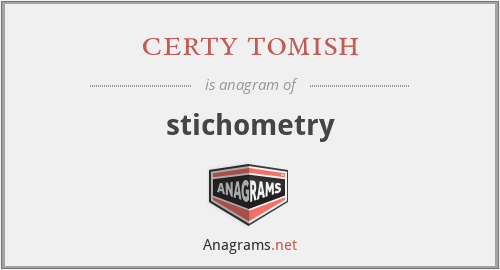What anagrams are available for stichometry?
This page is about an anagram for the word certy tomish that can be used in word games, puzzles, trivia and other crossword based board games.
certy tomish
Translation
Find a translation for certy tomish in other languages:
Select another language:
- - Select -
- 简体中文 (Chinese - Simplified)
- 繁體中文 (Chinese - Traditional)
- Español (Spanish)
- Esperanto (Esperanto)
- 日本語 (Japanese)
- Português (Portuguese)
- Deutsch (German)
- العربية (Arabic)
- Français (French)
- Русский (Russian)
- ಕನ್ನಡ (Kannada)
- 한국어 (Korean)
- עברית (Hebrew)
- Gaeilge (Irish)
- Українська (Ukrainian)
- اردو (Urdu)
- Magyar (Hungarian)
- मानक हिन्दी (Hindi)
- Indonesia (Indonesian)
- Italiano (Italian)
- தமிழ் (Tamil)
- Türkçe (Turkish)
- తెలుగు (Telugu)
- ภาษาไทย (Thai)
- Tiếng Việt (Vietnamese)
- Čeština (Czech)
- Polski (Polish)
- Bahasa Indonesia (Indonesian)
- Românește (Romanian)
- Nederlands (Dutch)
- Ελληνικά (Greek)
- Latinum (Latin)
- Svenska (Swedish)
- Dansk (Danish)
- Suomi (Finnish)
- فارسی (Persian)
- ייִדיש (Yiddish)
- հայերեն (Armenian)
- Norsk (Norwegian)
- English (English)
Definition
What does stichometry mean?
- Stichometry
- Stichometry is the practice of counting lines in texts: Ancient Greeks and Romans measured the length of their books in lines, just as modern books are measured in pages. This practice was rediscovered by German and French scholars in the 19th century. Stichos (pl. stichoi) is the Greek word for a 'line' of prose or poetry and the suffix '-metry' is derived from the Greek word for measurement. The length of each line in the Iliad and Odyssey, which may have been among the first long, Greek texts written down, became the standard unit for ancient stichometry. This standard line (Normalzeile, in German) was thus as long as an epic hexameter and contained about 15 syllables or 35 Greek letters.Stichometry existed for several reasons. Scribes were paid by the line and their fee per line was sometimes fixed by legal decree. Authors occasionally cited passages in the works of other authors by giving their approximate line number. Book buyers used total line counts to check that copied texts were complete. Library catalogs listed the total number of lines in each work along with the title and author.Scholars believe that stichometry became established in Athens sometime during the 5th century BC when copying prose works became common. Stichometry is mentioned briefly in Plato's Laws (c. 347 BC), several times in Isocrates (early to mid-4th century), and in Theopompus (late 4th to early 3rd century), but these casual references suggest the practice was already routine. The same standard line was used for stichometry among the Greeks and Romans for about a thousand years until stichometry apparently fell out of use among the Byzantine Greeks in the Middle Ages as page numbers became more common.The standard work on stichometry is Kurt Ohly's 1928 Stichometrische Untersuchungen which collects together the results of some fifty years of scholarly debate and research. Today, stichometry plays a small but useful role in research in fields as diverse as the history of the ancient book, papyrology, and Christian hermeneutics.
Embed
Citation
Use the citation below to add this anagram to your bibliography:
Style:MLAChicagoAPA
"certy tomish." Anagrams.net. STANDS4 LLC, 2024. Web. 18 May 2024. <https://www.anagrams.net/term/29277612>.



Discuss this stichometry anagram with the community:
Report Comment
We're doing our best to make sure our content is useful, accurate and safe.
If by any chance you spot an inappropriate comment while navigating through our website please use this form to let us know, and we'll take care of it shortly.
Attachment
You need to be logged in to favorite.
Log In